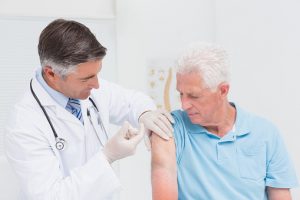
Shingles is a painful skin rash that commonly affects seniors and is more likely to occur in those who have previously had chicken pox. The shingles vaccine is recommended for those over the age of 60.
In ESRD the kidneys stops functioning, so patients require dialysis or a kidney transplant. Patients of ESRD are at a higher risk of developing infection and have a 72 percent increased risk for developing shingles.
“Previously the shingles vaccine was not widely given to patients on dialysis due to concerns of possible side effects and questions regarding its efficacy. Our study offers new real-world data to support the Centers for Disease Control’s [CDC] recommendation that elderly patients with chronic renal failure receive the shingles vaccine, if medically eligible,” explained study lead Hung Fu Tseng.
Previous research on the shingles vaccine found that those who receive the vaccine and still contract shingles have a lower risk of developing complications, such as post-herpetic neuralgia (or PHN), which is potentially a long-lasting painful complication of the illness. Other research suggests the shingles vaccine is still effective in seniors even if they have undergone chemotherapy.
The main findings of the study, which was conducted on 582 patients who were on chronic dialysis (some received the vaccine and others did not), were:
- The shingles vaccine was associated with a 50 percent lower incidence rate of shingles among ESRD patients.
- The three-year risk of shingles was 4.1 percent for those who were vaccinated and 6.6 percent for those who were not.
- If the vaccine was given within two years of beginning dialysis, the shingles incidence rate was less than one-third of the rate in unvaccinated individuals.